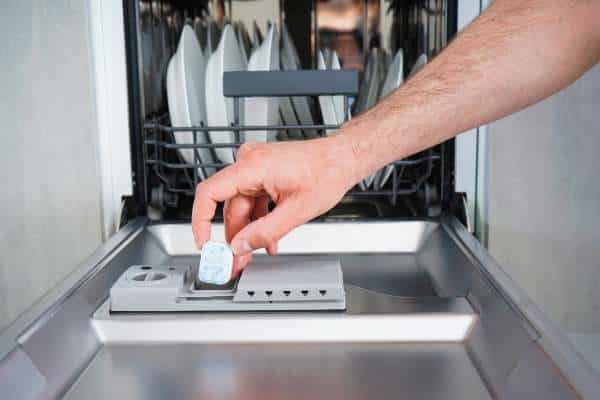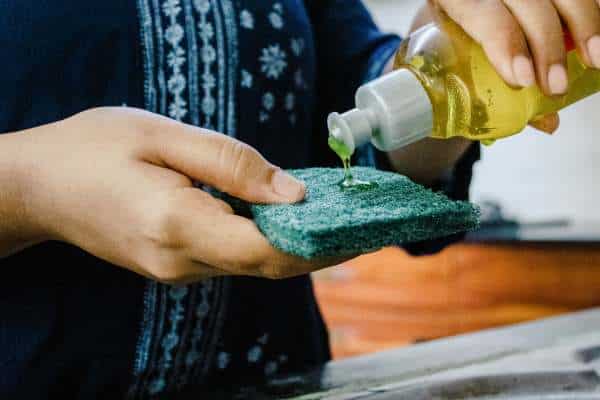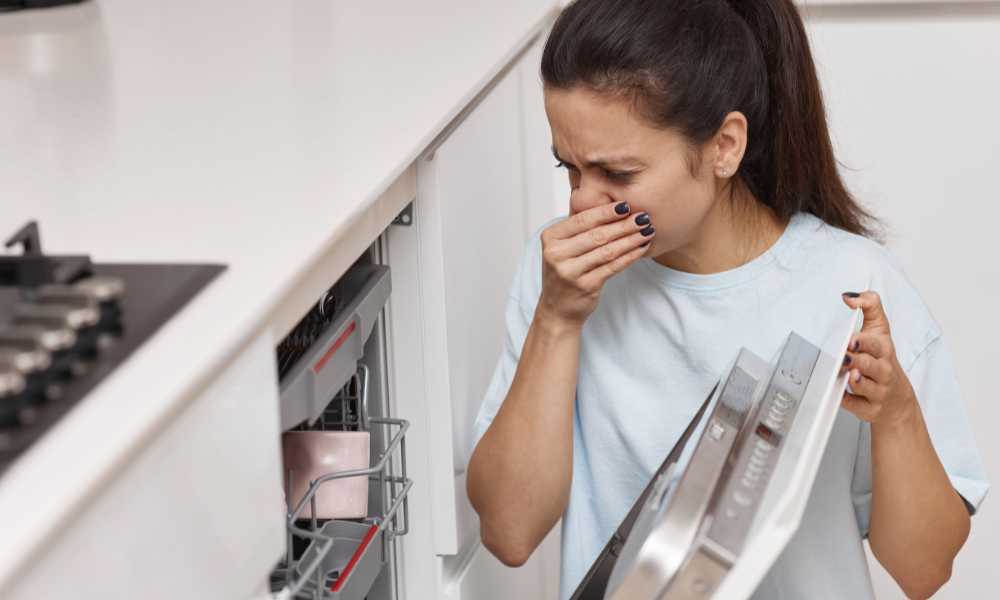If you’ve noticed an unpleasant odor coming from your dishwasher, you’re not alone. Many homeowners ask, “Why does my dishwasher smell?” This issue is more common than you might think and can be caused by various factors, from food buildup to mold growth. A smelly dishwasher not only affects your kitchen’s freshness but can also impact the cleanliness of your dishes. Fortunately, understanding the causes of these odors and knowing how to fix them can restore your dishwasher’s performance. In this article, we’ll explore the common reasons behind dishwasher smells and provide effective solutions to keep your appliance smelling fresh and working efficiently.
Common Causes of Dishwasher Smells

Dishwashers can develop unpleasant odors for several reasons, often related to food buildup or moisture accumulation. One of the most common causes is leftover food particles that get trapped in the filter, drain, or spray arms. These particles can decompose, leading to a musty smell. Another frequent issue is mold or mildew growth, especially in areas that remain damp, such as the door seals and interior walls. A clogged drain hose or standing water in the bottom can also contribute to lingering odors. Understanding the main causes of dishwasher smells is the first step in addressing and preventing the problem, ensuring your dishwasher stays fresh and efficient.
Food Particles and Debris
Asking “Why does my dishwasher smell?”, leftover food particles and debris are often the culprits. These particles can accumulate in areas like the filter, drain, or spray arms, creating a breeding ground for bad odors. If not cleaned regularly, the food buildup can lead to unpleasant smells and affect the dishwasher’s performance. It’s essential to regularly clean the filter and ensure no food remains trapped in the spray arms or drain. This simple maintenance step helps prevent odor-causing buildup, ensuring your dishwasher runs efficiently and keeps your kitchen smelling fresh. Regular cleaning is key to maintaining a hygienic, odor-free dishwasher.
Clogged or Dirty Filters
A common cause of unpleasant odors in dishwashers is clogged or dirty filters. When food particles and debris accumulate in the filter, they trap moisture and create a breeding ground for bacteria, which leads to foul smells. To prevent this, it’s important to regularly clean the filter, as this can significantly improve your dishwasher’s performance and reduce odors. Filters are typically located at the bottom of the dishwasher, near the drain. Simply remove the filter, rinse it under warm water, and use a brush to clear away any stubborn debris. Keeping the filter clean is a simple yet effective step in maintaining a fresh-smelling dishwasher.
Mold and Mildew Growth
One of the main reasons your dishwasher may smell is due to mold and mildew growth. Moisture and trapped food particles create the perfect breeding ground for these harmful substances. Over time, this can lead to unpleasant odors that linger even after a wash cycle. Signs of mold or mildew inside your Dish cleaning machine include visible black or green spots, a musty smell, or water that doesn’t seem to drain properly. Regularly checking and cleaning the rubber seals, door edges, and interior parts of your Dish cleaning machine can help prevent mold and mildew buildup, keeping your appliance fresh and functioning properly.
Standing Water in the Bottom

Standing water in the bottom of your dishwasher can be a major contributor to unpleasant odors. Stagnant water left behind after a wash cycle often becomes a breeding ground for bacteria and mold, resulting in a foul smell. If you’re asking “Why does my Dish cleaning machine smell?” this could be the culprit. To resolve this, it’s essential to check for drainage issues, such as clogged filters, blocked drain hoses, or malfunctioning pumps. Regularly cleaning your dishwasher’s drainage components and ensuring water flows properly will help prevent stagnant water buildup, keeping odors at bay and your appliance running smoothly.
Dirty Spray Arms
When addressing the question, “Why does my dishwasher smell?” one common cause could be dirty spray arms. Spray arms play a crucial role in cleaning your dishes by distributing water evenly during cycles. However, they can become clogged with food particles, grease, and other debris over time, leading to blockages that cause unpleasant odors. To prevent this, it’s essential to regularly clean the spray arms. Simply remove them and rinse them under hot water, using a brush or toothpick to dislodge any debris. This simple maintenance step can help keep your Dish cleaning machine smelling fresh and ensure it operates efficiently.
Soap and Detergent Residue

Using too much soap or the wrong type of detergent in your dishwasher can lead to a buildup of residue, commonly known as soap scum. This residue often collects in hard-to-reach areas, creating a musty smell that lingers even after cleaning cycles. To avoid this, always measure the detergent correctly and use one specifically designed for dishwashers. Ensure proper rinsing by running the Dish cleaning machine on a hot cycle occasionally to break down leftover residue. Regularly cleaning the interior and focusing on areas where buildup tends to occur can also help. Avoid overloading the Dish cleaning machine , as it may prevent proper rinsing and contribute to unpleasant odors.
Unpleasant Odors From the Drain Hose
One common cause of unpleasant odors from the drain hose is a clog or improper installation. If the hose is blocked with food particles or debris, water can’t drain properly, leading to stagnant water and foul smells. To resolve this, it’s important to regularly inspect the drain hose for blockages. Begin by disconnecting the hose from the Dish cleaning machine and checking for any visible debris or buildup. You can clean it using a long brush or a gentle water rinse. Additionally, ensure the hose is correctly installed, with no kinks or bends, which can hinder proper drainage and contribute to lingering odors.
Overuse of Dishwashing Detergents

Overusing dishwashing detergent is a common mistake that can lead to unpleasant odors in your Dish cleaning machine . Excessive detergent usage can result in soap scum and residue buildup, which not only causes bad smells but also affects your dishwasher’s efficiency. When too much detergent is used, it doesn’t dissolve properly, leaving behind a greasy film that traps food particles and moisture, creating an ideal environment for bacteria and mold growth. To avoid these issues, it’s essential to use the correct amount of detergent based on the dishwasher’s size and load. By following manufacturer recommendations, you can keep your Dish cleaning machine clean, odor-free, and functioning at its best.
Preventing Future Dishwasher Smells

To prevent future dishwasher smells, it’s essential to establish regular cleaning habits and maintenance routines. Don’t ignore cleaning the filters, spray arms, and drain hose, as food particles and debris can quickly build up. Don’t overload your Dish cleaning machine , as this can restrict water flow and lead to poor cleaning and lingering odors. Additionally, don’t use too much detergent, as excess soap can leave residue and cause bad smells. Follow best practices for loading dishes, choosing the right detergent, and running maintenance cycles like empty, hot-water cleaning cycles to maintain a fresh, odor-free Dish cleaning machine . Regular care will keep your appliance running smoothly and smelling great.
Conclusion
If you’ve been wondering, “Why does my dishwasher smell?” it’s likely due to food buildup, mold, or improper maintenance. Understanding the common causes—such as clogged filters, dirty spray arms, and excess detergent—can help you resolve and prevent unpleasant odors. Regular cleaning, proper loading, and using the right detergent are essential steps in maintaining a fresh-smelling Dish cleaning machine . If odors persist despite these efforts, it may be time to inspect the drain hose or consult a professional. By following these simple maintenance tips, you can keep your Dish cleaning machine running efficiently and ensure your kitchen stays fresh and odor-free.

